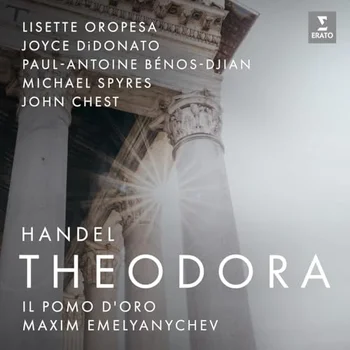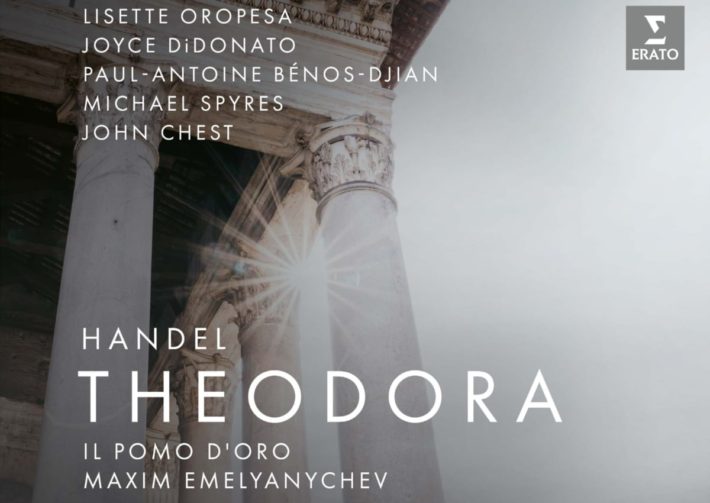The libretto of Handel’s “Theodora” is unique because it is not derived from a biblical story but rather Robert Boyle’s “The Martyrdom of Theodora and Didymus,” written in 1687. Its story describes the Christian martyrdom of Theodora and Didymus, which Handel’s audience would not have really known. The music is also unique for being rather somber overall, with a predominantly minor tonality. A significant number of the movements move at slow tempos, and there are fewer choral movements than normal. And to cap it off, the story has a tragic ending. There are perhaps some of the reasons it was not successful with English audiences: the oratorio was performed only two more times after its premiere on 6 March 1750, and when it was revived in 1755, it closed after one performance, making Theodora the least-performed oratorio during Handel’s lifetime.

Yet the composer considered it one of his best works, and the brilliance of this new performance suggests the performers feel the same. Lisette Oropesa’s Theodora is wonderfully sung and acted: how vividly she conveys Theodora’s unflinching faith (Act 1: Scene 3, tracks 14-15), as she calls on her fellow Christians to reject Rome’s earthly pleasures. More moving is the willingness to endure physical and emotional violence rather than denounce her faith (Act 1: Scene 5, tracks 24-25. Theodora’s duet with Didymus in prison (Act 2: Scene 5, tracks 48-54) is vulnerable and desperate, and yet how convincingly Oropesa conveys Theodora’s ecstatic acceptance of her (and Didymus’s) death sentence (Act 3: Scenes 3-5, tracks 61-74). Oropesa’s tone is richly burnished, vibrato never intrusive, with an enviable even tone across the music’s large melodic range.
Paul-Antoine Bénos-Djian proves Oropesa’s equal in his portrayal of her beloved Didymus. Their many duets are impassioned, their love believable and compelling. Bénos-Djian produces a warmer and more rounded tone than Robin Blaze does in the McCreesh recording (and Archiv’s brightly lit recording sometimes makes matters worse). There are several examples of the chemistry between these two performers, but none is more touching than “To thee, thou glorious son of worth” (Act 2: Scene 5, track 54).
Those coming to the recording to hear Joyce DiDonato’s Irene will not be disappointed – just sample her touching performance of the well-known aria “As with Rosy Steps” (track 20) or the gorgeous and emotional intensity she brings to “Lord, to Thee each night and day,” (track 57). Her singing at the end of the B section is simply ravishing. Michael Spyres’ lyrically supple tone is perfect for “Descend, kind Pity” (track 13), though his bravura reading of “Dread the fruits of Christian folly” is perhaps even more striking. John Chest ensures that Valens, the Roman leader of Antioch, is suitably arrogant and menacing. All these singers offer impressive ornamentation that is nevertheless always naturally conceived, never overdone.
Il Pomo d’Oro plays with both finesse and panache. I have written before about how they embrace a richer and more varied palette of colors compared to their English counterparts. The theorbo adds a more muted color to the continuo that better fits with the more somber atmosphere of much of this music. The chorus offers some wonderfully uninhibited singing, their extroverted ferocity as the Chorus of Heathens vividly differentiated from the serenely trusting Chorus of Christians. Conductor Maxim Emelyanychev clearly knows and admires the score, and his inspired leadership draws the listener in right away, making us first-person witnesses to the unfolding tragedy.
Erato’s recording is clear and warm, with soloists, choir, and orchestra skillfully balanced. Klaus Stübler’s liner notes are brief but informative, and a full libretto and translations are provided. (Thank you Erato!) It is good to see a full listing of the orchestral players, whose work adds so much to the success of this album.
Working on this review I was dismayed to discover I own the McCreesh recording. I have not listened to it in years, and that is my loss, because this is tremendous music. McCreesh’s album is surely the best in the English choral tradition, the performances by Susan Gritton and Robin Blaze in the main roles particularly touching. Yet a masterwork like Theodora is better understood and appreciated through multiple interpretations: Lorraine Hunt’s portrayal of Theodora in McGegan’s Harmonia Mundi recording is highly regarded, while the choral and orchestral work in the Neumann MDG recording is superb. But Erato’s new performance is perhaps the best I have heard, a superb combination of passion and precision, without a weak link in the cast. More importantly, it is gripping and theatrical, the emotions of the story seemingly foremost in the mind of every singer and player.
For listeners who do not know this music, this recording serves as an excellent introduction. And for those who already know the work, this may now be the best performance on record. All lovers of Handel will want to hear it – urgently recommended.
Recommended Comparisons
McCreesh | Harnoncourt | Christie | McGegan
Theodora
Theodora – Lisette Oropesa, Soprano
Irene – Joyce DiDonato, Mezzo-Soprano
Didymus – Paul-Antoine Bénos-Djian, Countertenor
Septimius – Michael Spyres, Tenor
Valens – John Chest, Baritone
Il Pomo d’Oro & Soloists
Maxim Emelyanychev – Conductor
Erato, 5419717791



















